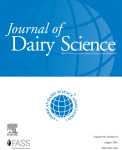Deleted member 6403
Made It Out The Hood
- Joined
- Apr 14, 2020
- Posts
- 56,259
- Reputation
- 96,649
The results of our study demonstrate that in mice, consumption of milk from pregnant cows did not affect plasma E1 and E2 levels; uterine weight in females; or testosterone levels, testicle, and seminal vesicle weights in males. We found elevated plasma estrogens and estrogenic effects in both sexes if milk with added 100 ng/mL of each E1 and E2 was included in the diet, but these doses exceeded physiological concentrations of estrogens by 1,000 times, and it is therefore extremely unlikely to find such concentrations in native cow milk. Our results suggest that estrogens in milk, even when derived from cows in the third trimester of pregnancy, do not pose a risk to reproductive health; even estrogens at concentrations 100 times higher than usually found in native milk (milk 10, 10.093 ng/mL of E1 and 10,065 ng/mL of E2) did not cause any physiological effects in the present study.

 www.sciencedirect.com
www.sciencedirect.com

Effect of dietary estrogens from bovine milk on blood hormone levels and reproductive organs in mice
Cows are often milked until 60 d before their next expected calving. Milk from cows in the third trimester of pregnancy contains up to 20 times more e…



